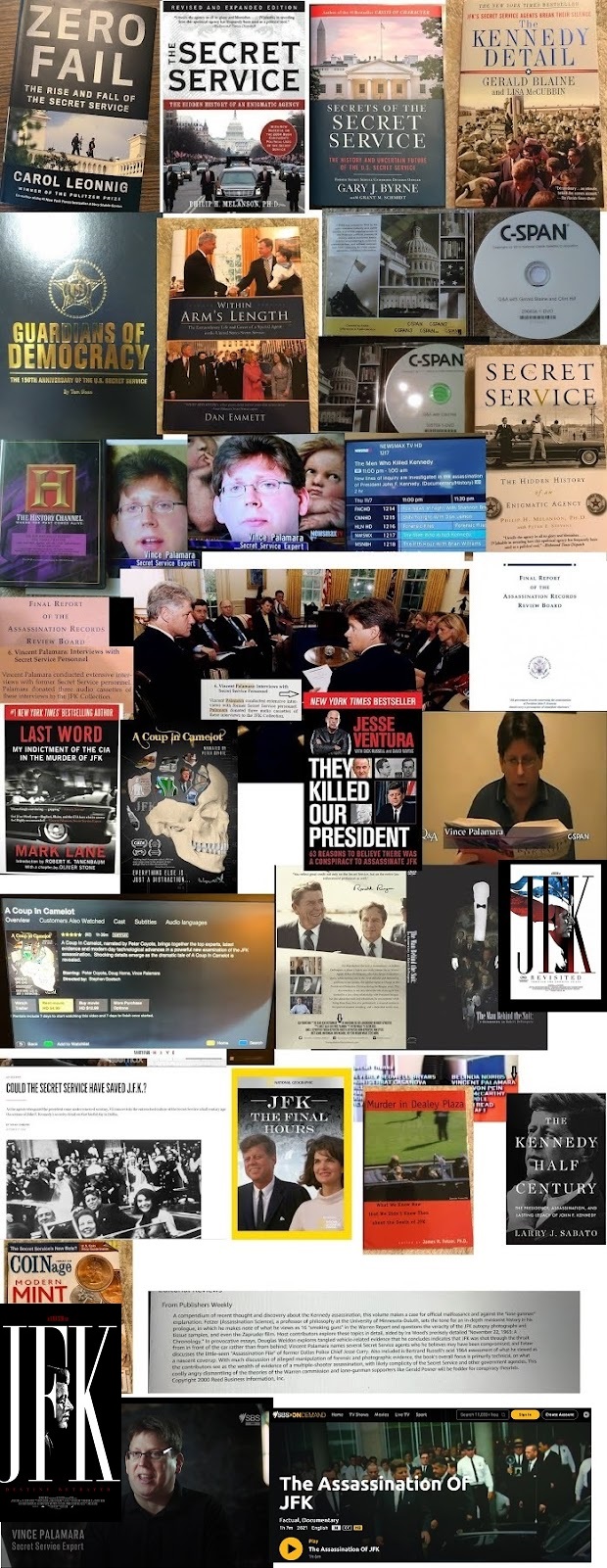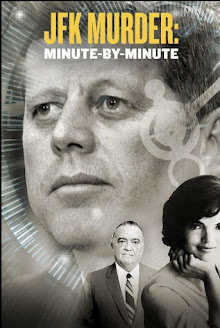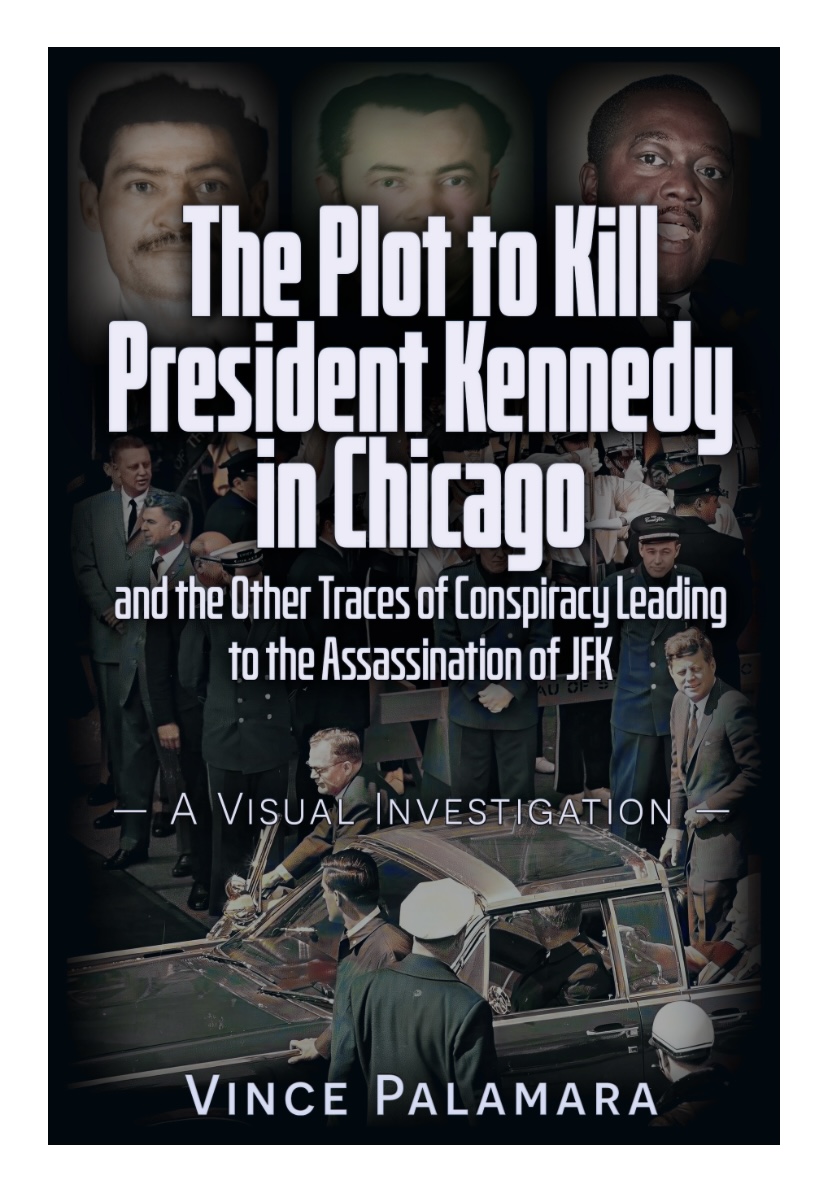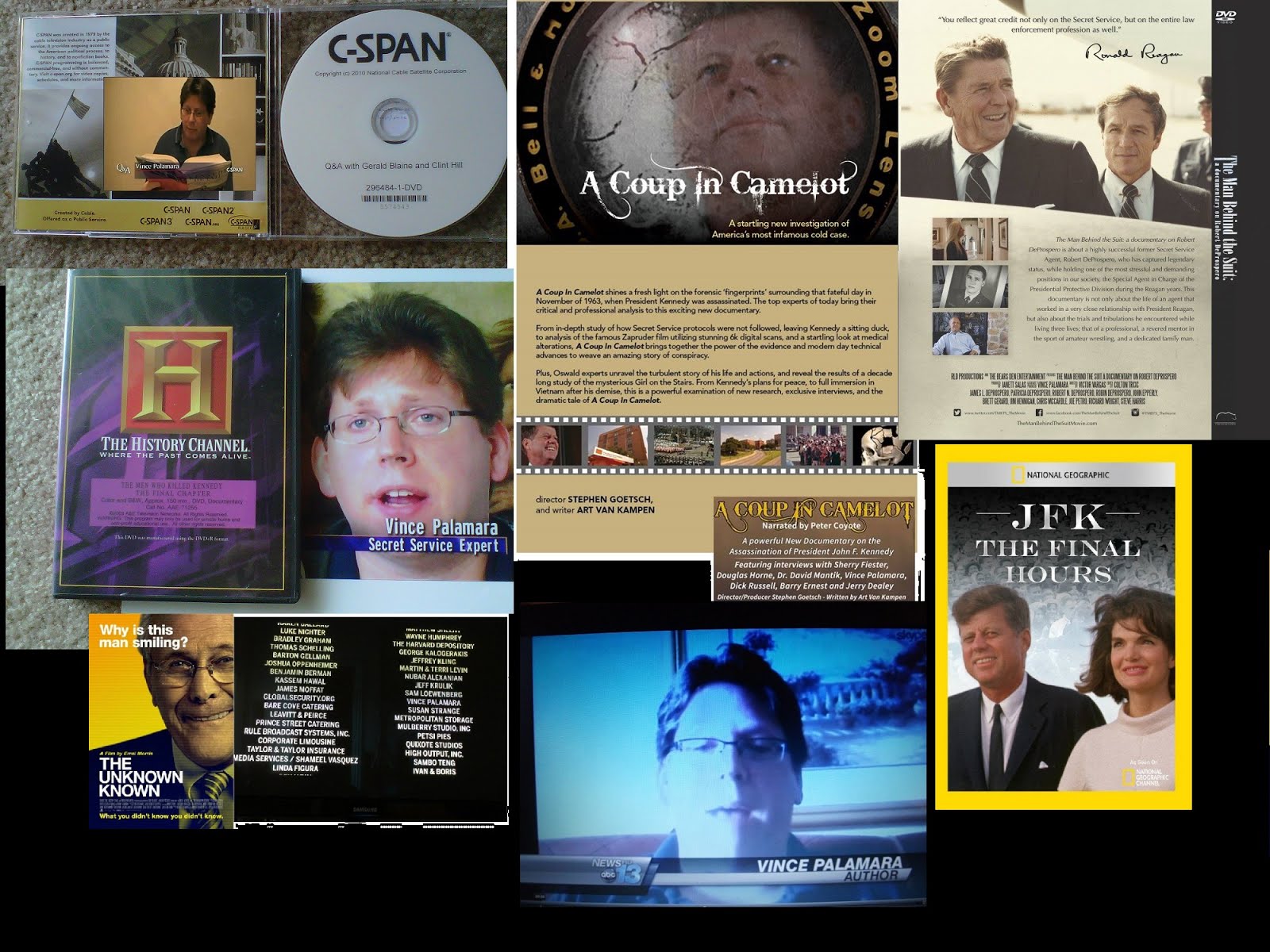'a guide on how to cover your a** after a tragedy'
I am mixed on my review for this one... On one hand its an interesting read with some great inside info on the behind the scenes goings of the secret service; on the other hand I detested the third person narrative it was written in. It really could have been written without all of the whining about lack of sleep, etc.... I also didn't like how the book seemingly blamed Kennedy for his own murder or the ignorant stance that The Warren Report was correct.... Please! These men were enlisted to protect the president and failed. That is a terrible tragedy in its self but don't take the stance that Kennedy had a death wish when the agents rolled over and didn't stand up and realistically relay the risks.
-----------------
My review is strictly focused on the literary work and it is abominable. Were it possible to give less than one star, I would have done so.
The narrative jumps all over the place. One cannot keep track of which date is being referred to ergo place goes completely out the window.
There is an annoying repetition of information, which quite often contradicts the one preceding it.
It is mystifying how conversations are quoted fifty years after having supposedly taken place.
Some of the minutiae is mind numbing.
As I have the audio version, the reading cannot go without comment. The feeble attempts to speak in JFK's accent are worse than those of a third rate Vegas lounge celebrity imitator. The Southern accents can be described as nothing more than degrading, demeaning and thoroughly insulting to even the lowest form of "Bubbaism" known to the spoken word. There is no consistency in the pronunciation of words such as Caroline - Carolyn. Come on pick one and stick with it!
I am about half way through this, the combination of the sloppy writing and awful narration have slaughtered my interest in finishing. So many books, so little time = why waste another moment on something as disappointing as this? Read Jim Douglass, Vince Palamara, and Mark Lane instead.
-------------
The book bears little evidence of having been written by someone with Blaine's background in security and technology. It gushes, it emotes, and it burdens readers with overabundance of trivial detail like travel writers. And, judging by her website, that is precisely what the "with author," Lisa McCubbin typically does for a living. It isn't hard to conclude that she was not the person who should have written this book.
That's unfortunate, because it could have been an important resource for historians for generations to come. Numerous interviews were conducted with the agents involved, but what we learn from them is the clothes they wore, the food they ate, and their feelings at particular moments. That's the stuff of travelogues but not of serious history.
Even worse, at critical points in the narrative the author seems unaware of the historical significance of what is taking place. One example is the clash that takes place between the local medical examiner and Secret Service agents over what is to be done with the President's body. Her focus isn't on what matters, the serious blunders that were being made by removing the President's body and limousine from the scene of the crime, it's on what Jacqueline Kennedy may have been feeling at that particular moment. McCubbin, whose adoration of the Kennedy's leaves her less than objective at times, seems unaware that in every other crime the victim's family simply have to cope with what criminal investigations require. Many of the conspiracies theories, which McCubbin clumsily dismisses near the end of the book, were born out of those blunders.
Finally, like others, I feel this book reads all too much like something that might have been written for Woman's Day magazine circa 1965. This book, in which "JFK's Secret Service Agents Break their Silience" contains almost nothing that those agents needed to be silent about. No one cares what they had for breakfast on that fateful day, and the details of the motorcade in which they participated have been known for decades. Others have described how the morale of JFK's Secret Service agents were destroyed by his pathological womanizing, which required unknown women to be smuggled into the White House or his hotel room at strange hours. But you will find not a word about that here. In this bit of romantic fiction, JFK was an ideal father in a storybook marriage. Lisa McCubbin didn't have to dwell on that sordid side of the Kennedy Presidency. But she should have at least shown us she was aware of it and discussed those aspects of it that were relevant to his Secret Service protection (Vince Palamara is a far better source).
In short, this book fails to deliver on its promises.
-------------
"The Kennedy Detail" takes poetic license regarding some crucial matters. For one, there was NO morning-of-JFK's-funeral meeting with Chief Rowley OTHER than to discuss the security for Jackie's walk to St. Matthews Cathedral. Everyone from this 47-year-old meeting---other than Blaine--- is conveniently dead and there is no documentation for this meeting to discuss JFK's alleged comments ("order") to remove the agents in Tampa on 11/18/63, used as a very lame excuse for why the agents weren't there on 11/22/63 (as agent Win Lawson said, there were no standing orders for the agents to stay off the back of the car and the matter never came to his attention---so much for the advance agents getting wind of these "orders"). Many agents and NON AGENTS (a crucial distinction Blaine doesn't get) have denied that JFK ever interfered with the Secret Service (what "code" would the NON SECRET SERVICE AGENTS have been following, Mr. Blaine?). In addition, Blaine makes a big deal about CE1025, the 5 reports submitted to Chief Rowley in April 1964 (only because the Warren Commission asked) regarding any statements JFK may have made regarding agents being on the rear of his car. Besides the fact that two of the agents---SAIC Behn & ASAIC Boring---denied the substance of their reports to the self-described "Secret Service expert" Blaine seeks to denigrate in "The Kennedy Detail", these reports were NOT just released in 1992, as Blaine alleges, but have been available since 1964, when the Warren Commission released their 26 volumes of hearings and exhibits for sale and library holdings. If that weren't enough, many major newspapers (such as The New York Times) and massive best-selling books (such as Jim Bishop's "The Day Kennedy Was Shot") made a great issue out of these after-the-fact reports; nothing whatsoever hidden there (and the aforementioned "Secret Service expert" [unnamed: Vince Palamara] has discussed these reports many times, as have others). As for the supposed Rybka misidentification, Rybka's family and a couple former agents were fooled, as well (especially considering the fact that both Emory Roberts and Win Lawson 'mistakenly' placed Rybka IN the follow-up car in their reports, only to 'correct' the record later). This also does not address the fact that Emory Roberts can clearly be seen rising in his seat and, using hand gestures, tells the agents (whether Rybka or, as Blaine states, Don Lawton) to fall back from the car, the agent raises his hands several times in response, Paul Landis makes room for the agent in the follow-up car, and the agents and aides in the follow-up car, without smiling, follow the agents' seeming perplexed reaction as the cars move on without him. Finally, with regard to the figurative "back stabbing" (not intended) Blaine states the "Secret Service expert" made with regard to documenting what the former agents said, keep in mind: if there was NO record, WHO would choose to believe what was said to a total stranger (especially over the word of former agents)? In the vernacular of today, "it is what it is": the former agents---AND NON AGENTS---said what they said and wrote what they wrote.
With that in mind, "The Kennedy Detail" is a book I recommend everyone buy and read---some very good information and photos, written by a good and honorable man who is obviously a very good and caring friend of his former comrades in arms, who, with a few noteable exceptions, are equally good and honorable men who were just doing their jobs and following orders when JFK was killed.
------------
As the leading civilian authority on the Secret Service, especially regarding the JFK/ LBJ era, and as someone who interviewed and/ or corresponded with close to 80 former agents between 1990-2006 (roughly double the number of former agents interviewed for this book), I was, needless to say, very much interested in what former agent and author Gerald Blaine (a nice gentleman I spoke to twice and corresponded with several times via e-mail), along with co-author Lisa McCubbin and fellow former agent Clint Hill (a very close friend of Blaine's to whom I had sent a 22-page letter to and spoke to very briefly and who also wrote the Foreword), had to say about President Kennedy and the tragic events of November 22, 1963, when the Secret Service failed in the worst way, costing the nation the life of our President. As a total stranger and an outsider, my contacts with the former agents were very much in the "cross examination" mode (often eliciting begrudging, not-too-friendly responses), while, as a trusted insider, it is fair to say that Blaine's contacts would be of the "direct/ friendly examination" variety. This dichotomy will become important for a number of reasons.
I am as certain as a human being can be that it was my lengthy letter to Clint Hill that led to the genesis of this book----I sent it in June of 2005 and received a very cantankerous "non-reply" when I phoned the gentleman this same time period. Also, during this very same time period, as Blaine admitted to the Daily Sentinel's Bob Silbernagel for his 5/23/10 article, Blaine began contacting as many living former agents who served President Kennedy for his book as he could (it is important to note that I also made contacts with Mr. Blaine during this time period, as well). Why am I so certain that my letter was a catalyst? As an ardent critic of the Secret Service's performance in Dallas (going much further than the two government "investigations", the Warren Commission and the HSCA), I sent Mr. Hill, in effect, a "Cliff Notes" version of my research for my own book ("Survivor's Guilt: The Secret Service & The Failure To Protect The President"), spelling out why I came to be certain that fellow former agents Floyd Boring (the number two agent on the Kennedy Detail and the Secret Service planner of the Texas trip), Shift Leader Emory Roberts (the commander of the agents in the follow-up car in Dallas), and William Greer (the driver of JFK's limousine on 11/22/63) were grossly negligent before, during, and after JFK was assassinated. Judging by Mr. Hill's "response" (or lack thereof), my attempt to address my concerns did not go over very well, to put it mildly.
As it bears directly on "The Kennedy Detail" , just what specifically are my concerns? Simply put: many of these former agents (and several White House aides), including several who passed away years before this book was even a thought, such as the number one agent on the Kennedy Detail, Gerald Behn; one of the three Shift Leaders, Arthur Godfrey; the number two agent on LBJ's detail (who ALSO had protected JFK), Rufus Youngblood; Sam Kinney, the driver of the follow-up car in Dallas; Robert Bouck, the Special-Agent-In-Charge of the Protective Research Section; Frank Stoner of the Protective Research Section; Maurice Martineau, the Acting-Special- Agent- In- Charge of the Chicago Office who protected JFK from '61-'63 whenever he came to the area; John Norris of the Uniformed Division; Dave Powers, the former curator of the JFK Library who rode in the follow-up car many times, including on 11/22/63; author Helen O'Donnell, daughter of the late Ken O'Donnell, JFK's Chief of Staff (based on her father's many audio tapes); and many others, told me, in no uncertain terms, that President Kennedy was a very nice man, NEVER interfered with the actions of the Secret Service, and, most importantly, DID NOT ORDER THE AGENTS OFF HIS CAR.
-------------
Monday, June 6, 2011
'a guide on how to cover your a** after a tragedy'
Labels:
11/22/63,
AFAUSSS,
Blaine,
Clint Hill,
gerald blaine,
gerald s blaine,
jerry blaine,
JFK,
Kennedy,
lisa mccubbin,
vince palamara
Subscribe to:
Post Comments (Atom)










































![VINCE PALAMARA [remember to scroll all the way down!]](https://blogger.googleusercontent.com/img/b/R29vZ2xl/AVvXsEjSZ-Z_puqnjl3UgdiJxBenMyIMaFhmBD-PYQUsxCtFS4UF7dJQB6n32rt9a0ZqFRPmuBoukhrMZxv6LOD9GoUGPiaShO3wj_8xL98obRAsUbIf0mXutzbq7jKDrCp8Y-Y0k9rnS5ARjQQ/s1600/11.jpg)


![CHAPTER 8 OF ARRB FINAL REPORT [I AM IN THIS REPORT, AS WELL]...HMMM---THE SECRET SERVICE DESTROYS](https://blogger.googleusercontent.com/img/b/R29vZ2xl/AVvXsEimGbOuG69gW-cgAbsfjd8p8PD-subznIjcsQXUSFq560o_kiXunf9TcH0fkOqmWuK73id6m5TyVMhWcfBrPUEee6JLbvqNZKdIVQa5Drcz568Ue6GZdf_PUtLuLwPDcucv3gOn5KGBZPw/s1600/DSCF0462.JPG)




No comments:
Post a Comment